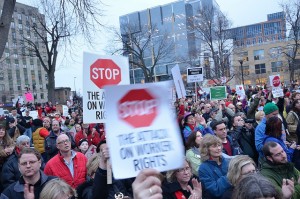 For well over 30 years now, we’ve been told that the solution to all that ails us is yet another tax cut–primarily for business and the top earners, which will eventually trickle down to everyone else and lift all our boats. We’ve also been told that the solution is to fix some single-issue “problem” in the public sector–e.g., teachers and public education, labor unions (both public and private), excessive regulation/red tape, get tough on crime, voter fraud, etc. And yet while marginal income rates and business tax rates have been repeatedly cut (and now are orders of magnitude lower than during the boom years of the 1950s and 60s), income inequality has steadily risen to levels matching or exceeding the Gilded Age and ancient Rome. Similarly, we’ve attacked both teachers and public education in general, public and private unions, gotten tough on crime, de-regulated banking, finance, airlines, and other economic sectors, and still . . . wages for everyone except the top 1% have been stagnant or declined, even as productivity has risen.
For well over 30 years now, we’ve been told that the solution to all that ails us is yet another tax cut–primarily for business and the top earners, which will eventually trickle down to everyone else and lift all our boats. We’ve also been told that the solution is to fix some single-issue “problem” in the public sector–e.g., teachers and public education, labor unions (both public and private), excessive regulation/red tape, get tough on crime, voter fraud, etc. And yet while marginal income rates and business tax rates have been repeatedly cut (and now are orders of magnitude lower than during the boom years of the 1950s and 60s), income inequality has steadily risen to levels matching or exceeding the Gilded Age and ancient Rome. Similarly, we’ve attacked both teachers and public education in general, public and private unions, gotten tough on crime, de-regulated banking, finance, airlines, and other economic sectors, and still . . . wages for everyone except the top 1% have been stagnant or declined, even as productivity has risen.
What if… it’s not about lower taxes, trickle down economics, or getting tough on crime, unions, teachers, public education, regulation? What if it’s just about concentrated, monopolistic economic power and the public policy choices that serve it?
 Two side-by-side op-ed articles in Monday’s NY Times seem to ask this question. In Knowledge Isn’t Power, Paul Krugman argues that “Rising inequality isn’t about who has the knowledge; it’s about who has the power.” And that the all too pervasive “education-centric” narrative promoted by the “very serious people” is a false side-show meant to distract us. In Even Better Than a Tax Cut, Lawrence Mishel, co-chair of Americans for Tax Fairness, similarly argues that rising inequality isn’t an act of nature or God: “Contrary to conventional wisdom, wage stagnation is not a result of forces beyond our control. It is a result of a policy regime that has undercut the individual and collective bargaining power of most workers. Because wage stagnation was caused by policy, it can be reversed by policy, too.”
Two side-by-side op-ed articles in Monday’s NY Times seem to ask this question. In Knowledge Isn’t Power, Paul Krugman argues that “Rising inequality isn’t about who has the knowledge; it’s about who has the power.” And that the all too pervasive “education-centric” narrative promoted by the “very serious people” is a false side-show meant to distract us. In Even Better Than a Tax Cut, Lawrence Mishel, co-chair of Americans for Tax Fairness, similarly argues that rising inequality isn’t an act of nature or God: “Contrary to conventional wisdom, wage stagnation is not a result of forces beyond our control. It is a result of a policy regime that has undercut the individual and collective bargaining power of most workers. Because wage stagnation was caused by policy, it can be reversed by policy, too.”
The point is that there are other policy choices we could make–besides endlessly lowering taxes or attacking teachers, labor unions, and regulation. What if we explored some of them in projects like Rewarding Work or The Future of Employment?

